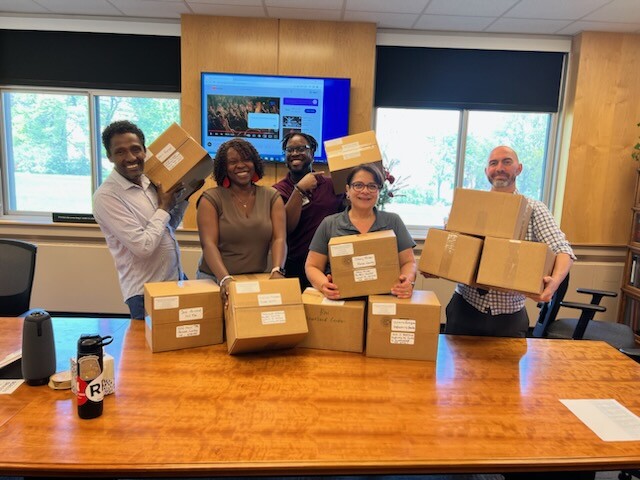
Throughout her career, Helen Abdali Soosan Fagan has dedicated herself to developing inclusive leadership capacity in people, and her work as coordinator of the Rural Fellows program is no different.
Since it began in 2013, the Rural Fellows program has provided students with the opportunity to live in towns across the state and work on locally-designed projects that help communities thrive, from helping establish a new community center to developing youth entrepreneurial classes.
To ensure everything runs smoothly — from placing students to communicating successes — it takes a larger team.

As the community engagement coordinator for the program, Darrell King Jr. works with community leaders throughout the entire process. After receiving an application from a community leader, he meets with them personally to talk about how the program can mutually benefit the community and students. With annual visits to the communities, he gets to see that impact firsthand.
“These visits allow us to gather feedback from a variety of sources, including community leaders, students and community members,” King said. “On our recent visit to Gibbon, Nebraska, we had a conversation with the community leaders, who expressed how impressed they were with their fellows Naidaly and Aruna. They believe the fellows’ personalities fit well with the city, and their projects are progressing well.”
While King works with the communities, Jennifer Okoliko, the student coordinator for the program and a doctoral student in human sciences, stays connected with the fellows and makes sure they are placed in the right community for them from the beginning. Okoliko noted the experiences help students get a clearer picture of their future career — what they do or don’t want to do — and sparks inspiration to volunteer more.
“It’s so fulfilling to see the joy and fulfillment as the leaders share about the impact the students are making and how glad they are to have them in the community. That just makes everything worthwhile,” she said.
The Rural Fellows team also includes a research assistant. Fikadu Reta Alemayehu, a doctoral student in leadership studies, has been with the program since last August and draws his passion for the program from his own background.
“Before moving to the USA from Ethiopia, I used to host study-abroad students from UNL,” Alemayehu said. “After visiting UNL in 2019 and 2021, I decided to pursue my Ph.D. in leadership studies. I am passionate about supporting students to succeed in their careers and work with rural communities due to the fact that I also come from a rural farming family background.”
In his role, Alemayehu collects data directly from the students and their host communities. He is able to use the insights to generate lessons and best practices, identify challenges and identify the best routes forward to support student and community development.
Russell Shaffer, a communications specialist, pulls together all of those threads to promote the work going on in the program to the general public, from getting fellows and staff on local television to recruiting students and communities for future partnerships.
“Each week students submit a ‘Fellows in Action’ update about what they’re doing in their communities and who they’re working/interacting with. Our social media coordinator, Paige Trumble, takes those reports, summarizes them into bite-size stories, and shares them on our Facebook, Instagram and Twitter accounts,” Shaffer said. “Our main focus of these stories is on how the students are growing as individuals, professionally and emotionally, and the people they’re impacting through their efforts.”

Fagan hears from many community leaders that their towns have improved greatly thanks to the help of the fellows. But the impact of the program extends beyond the communities: 97% of the fellows have said the experience prepared them for their future careers.
“Who are you becoming as a result of your experience here — helping people make meaning from actions and activities — is where growth happens,” Fagan says.
And though the work isn’t without challenges, Fagan knows the program ultimately impacts students and communities for the better.
“Embrace the suck because if it doesn’t challenge you, it won’t change you,” Fagan said.







